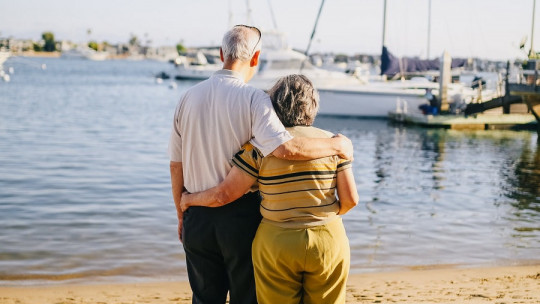
Although we are aware that we are born, live and must die as part of the life cycle of our existence, most people are not really prepared to face that moment.
during our life We are focused on achieving milestones, goals, objectives and we do not stop to think about our deathdue in part to the implicit belief that there is a long time ahead until then.
However, one day in our lives we can receive fateful news and be aware of the limited time we have left. So why not get ahead and spend more time on this personal preparation process?
For this reason, whether you are in that situation or not, you will find this article very interesting in which you can start facing death as something natural.
How to face our own death?
Being afraid of death is natural, when we know that the moment is approaching our thoughts and concerns focus mainly on being aware of what we are going to lose: loved ones, experiences that we enjoyed or had planned and material goods.
An irremediable concern arises for those who remain, feeling guilty for the emotions and discomfort that our death will cause them. And also, fear of pain, suffering, loss of faculties as a result of illness or great deterioration during old age.
Facing one’s own death is a mourning, it is still a loss. There are different phases, although it is important to emphasize that people are different based on our experiences, expectations, beliefs and coping skills. We can go through all the phases or some, even go through it again several times.
1. Denial
It is usually the first reaction, we don’t believe that our end is really near. We deny that reality.
2. Anger
Situations of anger, guilt at self or other people. We believe there must be a culprit.
3. Negotiation
We negotiate with ourselves, We make promises to ourselves believing that if we change something we can avoid our death.. For example, a healthier lifestyle.
4. Depression
We feel like we can’t do anything anymore and we have no motivation to try to continue or enjoy anything. Feelings of emptiness and hopelessness appear. We may even feel injustice because he has touched us and we wonder why we deserve it.
5. Acceptance
Reaching this stage is the most adaptive part of the personal grieving process. We actively enjoy the time we have left. Professional help may be needed to reach this stage.
What can we do until the end comes?
We can follow guidelines to cushion the suffering we experience and in this way progressively approach the acceptance phase.
1. Identify fear
Being aware of what causes us fear and concern, we can make a list that will help us work on those things.
Expressing these implicit concerns will help you understand them.. It may be important to talk to our loved ones or to a psychologist who will know how to guide you in the process like Verónica Valderrama Hernández from Psicoalmeria. Identifying and expressing our fears is comforting, we live immersed in a society where it seems taboo to talk about death.
2. Be grateful for our experiences
It consists of remembering all the positive experiences in our lives and all our goals achieved.. Feeling that we have lived, giving more importance to everything we have experienced and less value to the pending things. Live intensely in the present and really do what we like every day.
3. Unfinished business
We can do a list of pending situations that we want to resolve: resolve a conflict with an important person, make a will, etc… We will feel calm when resolving these issues and our feeling of guilt or responsibility for what will happen after our departure will decrease.
4. Help other people
It is rewarding to help and share with other people who are dealing with the same situation.. Share our point of view or perspective and empathize with others. Groups dedicated to this topic can be very useful.
Finally, it is important to keep in mind that when we are dead we will not feel or suffer, all the worries that we had before that moment will not exist. Our fear is in life, and it is what limits us and subtracts quality time before the end.
Helping a loved one in the final phase of life
After receiving the news that a loved one is in the final stage of their life, we will initially have to deal with personal grief. Once we have properly managed that reality through acceptance, we can help our loved one. Below are some guidelines that are useful for this situation.
1. His presence
It will be important for your loved one to feel that you are close.. Sometimes it is not necessary to talk and a smile, a caress or being by your side will be equally comforting.
2. Talk about death
Many people at the end of life need to talk about death; If you are prepared, it will be important to listen actively. Avoid changing the subject or downplaying it; not only will it not reduce the loved one’s discomfort, but it will also make them feel more misunderstood.
In many cases it is not necessary to even give answers since the person in the terminal phase will be able to ask questions as a reflection, you just have to listen and reflect with them, they are carrying out a process of integration and meaning at the moment they are in.
3. Psychological care
Your loved one may need to deal with all the fears and worries they are experiencing. Asking for professional help will be of great help.
4. Isolation
Sometimes the person who is in the final phase isolates themselves, avoids the presence of their loved ones or refuses to let them see them. You must understand that it is a natural process that can occur, do not take it personally. It is a natural process aimed at disconnection with life.
Grief after the loss of a loved one
After the loss of a loved one, we will begin a necessary process to be able to understand and integrate all the thoughts, emotions and feelings we experience. Finally, when we finish grieving, if it has been done in an adaptive way, we will be able to give life a purpose and a meaningful direction. Below are some guidelines that can help during the grieving process:
1. Talk about your loved one
It is comforting to talk about it with close people or friends. Feeling and remembering that he has been in our life is necessary. Not speaking or trying to hide memories can distance us from reality and isolate us.potentially generating intense emotional discomfort.
2. Acceptance of feelings
will experience many feelings such as sadness, anger, exhaustion, frustration. Recognizing and naming them will make you aware of what you experience and you will be able to accept them as something natural and necessary.
3. Take care of yourself
It will be necessary to make an effort but you will have to take care of yourself (eat well, exercise and rest). It will also be good for you to take care of other family members who need it.
4. Help other people
Share your feelings and thoughts with others dealing with the same situationit’s very comforting.
5. Remember to be loved on important dates
You will be able to continue integrating the memory into your life and remembering your loved one along with other important people.
6. Professional help
If you feel that the situation is unsustainable, you are not alone, go to a psychology professional. Adaptive grief is important to continue with our lives.
If you are going through these situations, I can accompany you and help you. I am Verónica Valderrama Hernández from PsicoalmeriaAs a psychologist, I will teach you how to work on fear, anxiety or feelings of guilt in a more adaptive way.
If you or a close family member need to deal with grief related to death, with my support, training and experience you will be able to develop the resilience and psychological strategies necessary to buffer negative feelings.








